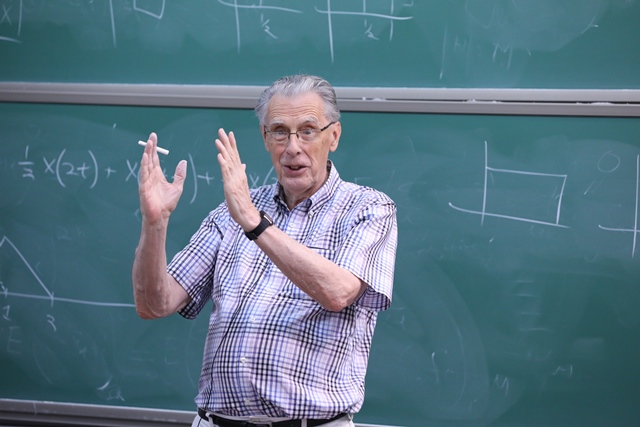[Repost] Interview of Professor John Hopcroft by China Daily
Original Title: Top US computer scientist puts chips on Chinese undergraduates
Forward from: https://www.chinadaily.com.cn/a/201811/12/WS5be8d6d1a310eff303287f70.html
John Hopcroft teaches Turing Class, an elite undergraduate program at Peking University
Renowned computer scientist John Hopcroft is helping improve the quality of undergraduate education in China.
The 79-year-old US citizen earned a doctorate in electrical engineering from Stanford University in 1964 and went on to win the Turing Award, the highest distinction in computer science, in 1986 with Robert Tarjan, another US computer scientist, "for fundamental achievements in the design and analysis of algorithms and data structures".
Hopcroft has now shifted his focus to education, and is endeavoring to advance reform of China's education system to better develop computer science talent, with an emphasis on undergraduate education.
"When I was young, I earned my professional reputation," he said. "But when I got older, I wanted to do something that can make the world better."
Hopcroft has spent three months teaching computer science to undergraduates at Shanghai Jiao Tong University every year since 2011, and has celebrated six Christmases with his Chinese students.
He has given the university course materials based on his research for free on the condition that any publications using them should be sold for less than 30 yuan ($4) so that students from impoverished backgrounds can afford to use them.
Last year he also began teaching Turing Class, an elite undergraduate program at Peking University aiming to cultivate computer science talent, as director of its Center on Frontiers of Computing Studies.
"I started working in China about eight years ago," he said. "Gradually, I've learned what needs to be done. It could be something relatively easy but it has a significant impact.
"China's population is about 1 billion and there are 20 million students in universities. But opportunity is not equal for everybody. One university is not going to fix the problem, it's going to be the system."
He said he faced hurdles when he first proposed reform of China's education system.
"We recommended evaluating the teaching quality at universities and producing a ranking of universities based on the quality of undergraduate programs," he said. "I understand there will be a nervousness about creating a ranking of universities (for the government)… so we have the backup plan of rewarding teachers to help improve their teaching quality."
In July last year, Hopcroft, with support from the Ministry of Education and the National Natural Science Foundation of China, initiated the "J.H. teacher award plan".
Each year, 54 selected teachers in undergraduate computer science programs from top Chinese universities-the so-called C9-will receive 70,000 yuan in bonuses financed by companies such as Baidu and Microsoft Research.
The C9 are Peking University, Tsinghua University, Zhejiang University, Fudan University, Shanghai Jiao Tong University, Nanjing University, the University of Science and Technology of China, Harbin Institute of Technology and Xi'an Jiaotong University.
"The plan starts from computer science courses in the C9 this fall, and will be expanded to five important areas in 42 universities nationwide— civil engineering maybe-next year," Hopcroft said.
"It (teaching quality) is a commitment by faculty members to educating the next generation, and those who stand for it say the most important thing is that the faculty member cares about the success of the student.
"But now, faculty members are just trying to survive. At many universities, a teacher is rated by how much research money he can bring in or how many papers he has published. However, these two bench marks have little to do with the vision of a university that focuses on producing the next generation (of talent).
"I've noticed recently that a few faculty members have started to be really engaged in quality teaching, so it looks like it's starting to change, but it is still hampered (by the system)."
Hopcroft said he has been impressed with the progress China has made in education in recent decades and, despite the challenges, remains convinced education in the country has a bright future.
Hopcroft received the Friendship Award, the nation's highest honor for foreign residents, in 2016 and was made a foreign academician of the Chinese Academy of Sciences last year.







